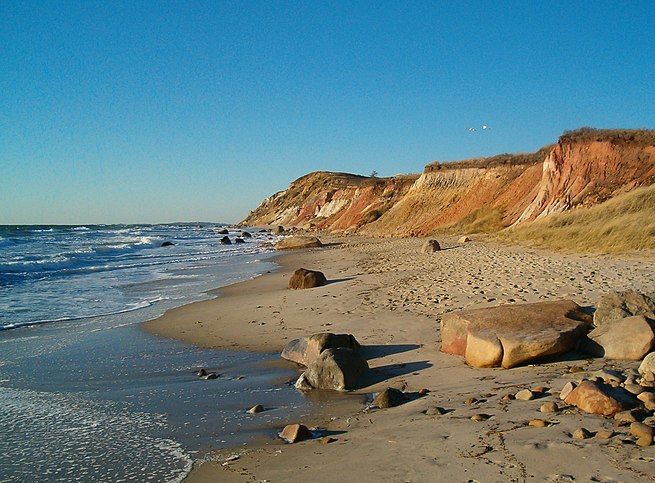
Main Difference
The main difference between Clay and Mud is that the Clay is a soft rock based compound often used for sculpture and tools and Mud is a mixture of water and any combination of soil, silt, and clay.
-
Clay
Clay is a finely-grained natural rock or soil material that combines one or more clay minerals with possible traces of quartz (SiO2), metal oxides (Al2O3 , MgO etc.) and organic matter. Geologic clay deposits are mostly composed of phyllosilicate minerals containing variable amounts of water trapped in the mineral structure. Clays are plastic due to particle size and geometry as well as water content, and become hard, brittle and non–plastic upon drying or firing. Depending on the soil’s content in which it is found, clay can appear in various colours from white to dull grey or brown to deep orange-red.
Although many naturally occurring deposits include both silts and clay, clays are distinguished from other fine-grained soils by differences in size and mineralogy. Silts, which are fine-grained soils that do not include clay minerals, tend to have larger particle sizes than clays. There is, however, some overlap in particle size and other physical properties. The distinction between silt and clay varies by discipline. Geologists and soil scientists usually consider the separation to occur at a particle size of 2 µm (clays being finer than silts), sedimentologists often use 4–5 μm, and colloid chemists use 1 μm. Geotechnical engineers distinguish between silts and clays based on the plasticity properties of the soil, as measured by the soils’ Atterberg limits. ISO 14688 grades clay particles as being smaller than 2 μm and silt particles as being larger.
Mixtures of sand, silt and less than 40% clay are called loam. Loam makes good soil and is used as a building material.
-
Mud
Mud is a liquid or semi-liquid mixture of water and any combination of different kinds of soil (loam, silt, and clay). It usually forms after rainfall or near water sources. Ancient mud deposits harden over geological time to form sedimentary rock such as shale or mudstone (generally called lutites). When geological deposits of mud are formed in estuaries the resultant layers are termed bay muds.
-
Clay (noun)
A mineral substance made up of small crystals of silica and alumina, that is ductile when moist; the material of pre-fired ceramics.
-
Clay (noun)
An earth material with ductile qualities.
-
Clay (noun)
A tennis court surface.
“The French Open is played on clay.”
-
Clay (noun)
The material of the human body.
-
Clay (noun)
A particle less than 3.9 microns in diameter, following the Wentworth scale.
-
Clay (noun)
A clay pipe for smoking tobacco.
-
Clay (noun)
A clay pigeon.
“We went shooting clays at the weekend.”
-
Clay (noun)
Land or territory of a country or other political region.
“Danzig is rightfully German clay.”
-
Clay (verb)
To add clay to, to spread clay onto.
-
Clay (verb)
To purify using clay.
-
Mud (noun)
A mixture of water and soil or fine grained sediment.
-
Mud (noun)
A plaster-like mixture used to texture or smooth drywall.
-
Mud (noun)
Wet concrete as it is being mixed, delivered and poured.
-
Mud (noun)
Willfully abusive, even slanderous remarks or claims, notably between political opponents.
“The campaign issues got lost in all the mud from both parties.”
-
Mud (noun)
Money, dough, especially when proceeding from dirty business.
-
Mud (noun)
stool that is exposed as a result of anal sex
-
Mud (noun)
A particle less than 62.5 microns in diameter, following the Wentworth scale
-
Mud (noun)
A black person.
-
Mud (verb)
To make muddy or dirty; to apply mud to (something).
-
Mud (verb)
To make turbid.
-
Mud (verb)
To participate in a MUD or multi-user dungeon.
-
Clay (noun)
a stiff, sticky fine-grained earth that can be moulded when wet, and is dried and baked to make bricks, pottery, and ceramics
“a clay soil”
“a clay tile”
“the soil is mainly clay”
“the rocks are covered by various mixtures of loose clays and sands”
-
Clay (noun)
sediment with particles smaller than silt, typically less than 0.002 mm.
-
Clay (noun)
a hardened clay surface for a tennis court
“she won more matches on clay than any other player”
-
Clay (noun)
the substance of the human body
“this lifeless clay”
-
Clay (noun)
a European moth with yellowish-brown wings.
-
Mud (noun)
a computer-based text or virtual reality game which several players play at the same time, interacting with each other as well as with characters controlled by the computer.
